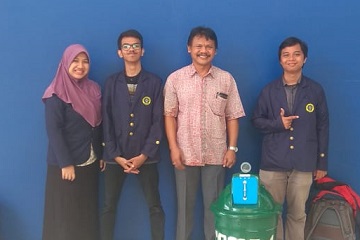Unique Dustbin by IPB Students Can Talk and Doesn’t Smell

Garbage is one of the biggest problems in Indonesia which is caused by the lack of awareness in people to not throw their waste carelessly. Bogor Agricultural University (IPB) students invented a unique dustbin, Comfybin, that can reduce the smell from the waste and can produce an appreciation speech.
The unique dustbin is an invention of three IPB students, who are Farel Firman, Giri Nugroho, and Anisa Agustina Ansory from Faculty of Mathematics and Natural Sciences (FMIPA) IPB. The bright idea passed as one of the finalists in Students Creativity Program (PKM) in Creation, and was guided by Dr Ir I Made Sumertajaya, Msi.
Farel explained that the Comfybin idea popped up out of their concern with waste problem around the campus, as well as to increase people’s awareness to dump their waste carefully.
“Actually, this idea appeared from the environment around my rented house, in which there is a big dumpster and smelled so bad. People were avoiding the smell, so an idea to invent a dustbin that doesn’t emit a smell appeared. And to make it more interesting, the dustbin is equipped with sensor application that can create sound,” explains Farel.
Anis explained that Comfybin’s design was created by the team by modifying the conventional dustbins. “We tried to create our own design by utilizing the conventional dustbin and modify it. We made two layers to place the sensor that can produce an appreciation speech in two languages, Bahasa and Sundanese for West Java region. The speech will be like ‘terima kasih sudah menjaga kebersihan lingkungan kita’. We also put zeolith (active carbon) in the chimney to filter the air transported out from the dustbin.”
Comfybin is planned to be a portable dustbin and can be implemented in many places. “We can just modify existing dustbins. We can use battery, powerbank, or accumulator as the electric source. We plan to place these bins in town parks, temporary dumpster in homes, campuses, and schools and adjust the language to the local’s,” said Anis.
Anis and team hope that the design of this tool can be mass-produced by regional governments to increase people’s awareness to throw away they garbage carefully.
"We hope that this dustbin can be one of the regional government’s project, an education tool for children and students, and to be further developed with the implementation of garbage separation and automatic signal when the bin is already full. We hope the government can utilize our product to make more dustbin that can reduce air pollution and also educative,” says Anis.(Ard)



